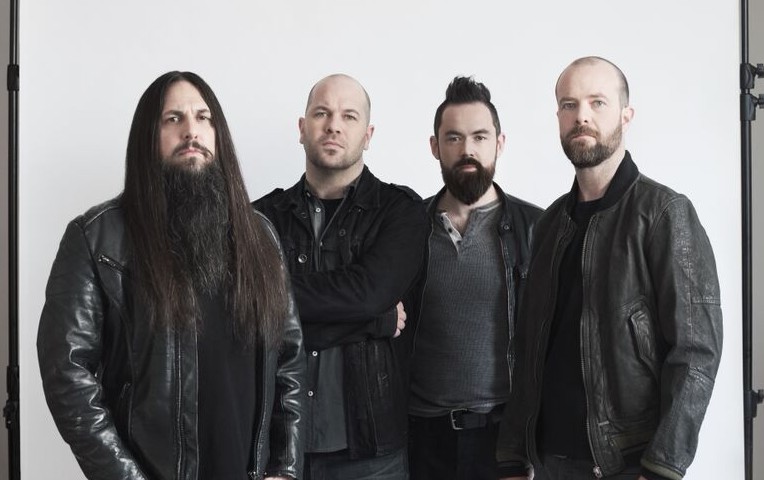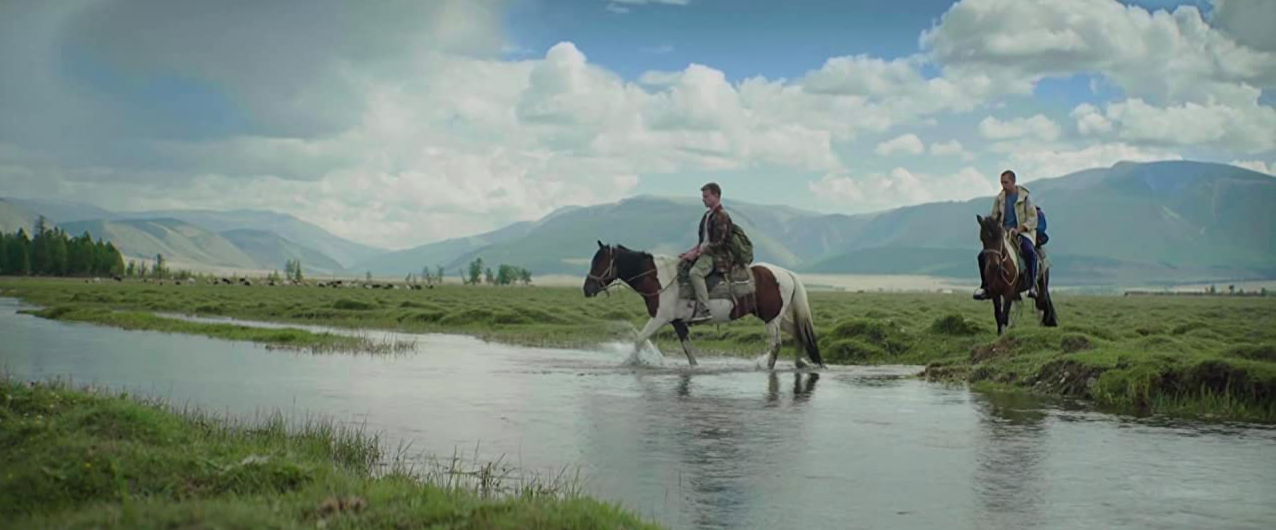
I, like many other young people, started getting into music through listening to modern rock radio. As a teenager, 99.9 The Buzz was the Montreal station of choice and it spun hits by great American and Canadian alternative rock artists. The pop stations weren’t loud enough and CHOM, the classic rock station, always felt geared towards an older demographic. One of the most prevalent bands on The Buzz was Finger Eleven. I honestly can’t say I had heard much from Finger Eleven since their hit “Paralyzer” completely dominated the airwaves back in 2007. Nonetheless. Finger Eleven have kept trucking, being nominated for Juno’s and are releasing their newest album, “Five Crooked Lines” this July 31 after five years since their last album, “Life Turns Electric.” Guitarist Rock Jackett has been with Finger Eleven for the whole ride, and I managed to get some questions to the band that I always wanted answered.
Kyle Lapointe (KL): Hey Rick, few people know this but your band’s original name was The Rainbow Butt Monkeys. Why’d you guys decide to change the name?
Rick Jackett (RJ): Well, I think it’s sort of obvious (laughs). That was our high school band and we started out when we were fifteen and sixteen years old. It was awesome, but after touring for the first record, we decided this was something we wanted to do for our whole lives. We thought that by calling ourselves The Rainbow Butt Monkeys we’d limit our opportunities. I didn’t want to be a thirty-five year old man referred to as a butt-monkey. The name was also distracting. People were judging us before they heard our music and we wanted our songs to come first. It’s amazing that name still lived on.
KL: Finger Eleven’s a pretty cool name too. I read that the name came from lyrics from one of your older songs called “Thin Spirits.” Do you get a lot of people who don’t know the origin of the name and try to guess where it’s from?
RJ: Absolutely. That’s one of the things I personally love about the name. Some people think it stands for two fingers up in the air, and there are also tons of sexual references. You could just imagine. They go from creepy to funny. The most entertaining one though was when we first changed the name. One of the first radio stations to announce it said we had changed our name to “Finger of Loving.”
KL: You guys are still together now, after such a long time with the name. How are you feeling about your upcoming album, “Five Crooked Lines”?
RJ: I feel great. I’m so excited and proud for this new record — it really took us a while to make. We had high expectations for this record, but I think it went to a place we didn’t realize it could go. I think we created something we hadn’t achieved in a while.
KL: You guys parted with your longtime drummer Rich Beddoe a couple years back. How was it going into this new record with your new drummer, Chris? You can’t just inject new members into bands and expect the chemistry to work out, can you?
RJ: We parted with Rich about halfway through writing this album. We had never met Chris before we started recording with him for this album, so we were pretty nervous. We thought, “What happens if we get down to Nashville and this guy’s an asshole?” It wasn’t like that at all though. Within the first hour we were jamming into the songs.
KL: Listening through, I felt there were some things you did differently this time around. At over seven minutes long, is “Come On, Oblivion” the longest song you guys ever recorded?
RJ: I think it is. We’ve always loved Pink Floyd and all those trippy kind of bands who have patience. I think it’s one of those songs we’ve been trying to write our whole career.
KL: Most of your songs are pretty concise and on-point. When I heard that one I imagined you guys saying, “Fuck it, let’s just keep going.”
RJ: (laughs) That’s pretty much what happened, man. When we started writing that song, we thought it was pretty cool but we didn’t think we could use it in our Finger Eleven world. It allowed us to realize that this record could be really different and special.
KL: What song on this new record would you say you’re most proud of as a musician?
RJ: “Come On, Oblivion” is one of those songs that I’m proud of. I also think “Five Crooked Lines,” the title track, is a really neat song with cool instrumentation too, and it’s very different for our band as well.
KL: For people who haven’t heard your new album yet, what should they expect going into it?
RJ: After being six records in with so many top 40 hits, I don’t think most people will be expecting this record to be so heavy. I also think this record from beginning to end is a great listen. We wrote a ton of songs for this record and we realized it could go any way we wanted. We had enough songs to make a pop record and enough to make a heavy record. When we got to Nashville it became clear to us that the best songs were the heavier ones and that made us all really happy.
KL: I read somewhere that when you guys released your self-titled album, some of you thought your heavier song “Stay In Shadow” would be the big hit but it ended up being the acoustic ballad, “One Thing.” What’s that say about predicting what people will like on your album?
RJ: I think trying to predict is a dangerous game that we’ve dabbled in. I think we’ve learned from our mistakes. To make other people happy you need to make yourself happy first. This record was really about making us as a band happy. That was the goal, to please ourselves first and foremost. Hopefully what we like will please our fans. My favorite songs on this record are the ones that will probably never see the light of day on any mainstream radio.
KL: I grew up hearing your songs on that mainstream radio. Sometimes I’d hear your songs would be censored. How do you feel about stations and other media censoring music in that way? I could imagine some musicians feel they’ve created art and wouldn’t want anybody to censor their expression.
RJ: The true artist in me thinks censoring art is the worst thing in the world. At the same time though, I think it’s someone else’s problem. I’m not sure why the powers that be need to censor certain words. I understand the politics though and it’s their problem, not ours. We, as a band, don’t self-censor. We just make the songs and if someone else wants to change it, that’s their problem.
KL: What’s the strangest place you ever heard your song playing?
RJ: Aside from places like Shopper’s Drugmart (that’s always weird) the strangest place might have been Disneyland. It was “Paralyzer” (laughs).
KL: Have you ever heard people cover your songs?
RJ: Oh, absolutely, I’ve seen people butcher us. One of the most-covered songs we have is “One Thing.” That song isn’t as simple as it sounds though. We’ve watched a couple cover bands destroy it.
KL: Have you ever heard a cover band play one of your songs better than the original?
RJ: No… No way. That never happens…
KL: If you could say you’ve got one goal moving forward with this band what would it be?
RJ: We really take things step-by-step, record-by-record. We try to make a record we’re proud of, then play it for enough people that we could make another one. At our first record we never thought we’d get to a seventh. One of the cool things about this band is that the individual is very celebrated. The hardest part though is getting all those individual ideas into one place. It’s sometimes hard to keep individual happy and feeling like they’re expressing themselves.
KL: Do you find you guys often disagree over which songs you individually enjoy?
RJ: You could usually tell if the others don’t like a song by the lack of response it gets. We don’t really tell each other, “That’s a crappy idea, you’re stupid for liking it!” We usually go, “Wow, it’s cool that you enjoy that idea,” and then we never talk about it again. If no one jumps onboard you think, “Alright, I guess this is the one only I like.” Definitely on this record there were songs in danger of getting left behind and someone championed for them. Certain songs were fought for by one of us and I’m very happy they’re on the record.
KL: Are there any songs in your repertoire you don’t like so much but you kind of have to play live?
RJ: Not really, our bigger hits are awesome to play live. There’s nothing like the crowd’s reaction when they hear the songs they know. We enjoy playing the more popular songs anyways so it works out.
KL: You could also make songs new and change them up in a live setting to mix it up.
RJ: That’s true too. So many bands are obsessed with sounding exactly like they do on record, even bringing tracks onto a live setting. I’ve always been a fan of bands like Led Zeppelin and Pink Floyd. If you see a video of Zeppelin, they’re playing the song that’s on record but they’re having fun with it and taking liberties. We try to embrace that kind of idea.
I had listened to the album before interviewing Rick and it was a little heavier than I had anticipated. It starts off with the booming ‘Gods of Speed” and then heads through eleven more tracks. I’d have to say my favorite is the first single, “Wolves And Doors” which has a dancey vibe to it reminiscent of Paralyzer, and great, hypnotic guitar parts. You can listen to it here:
Five Crooked Lines comes out July 31st on the Bicycle Music Company Label.




